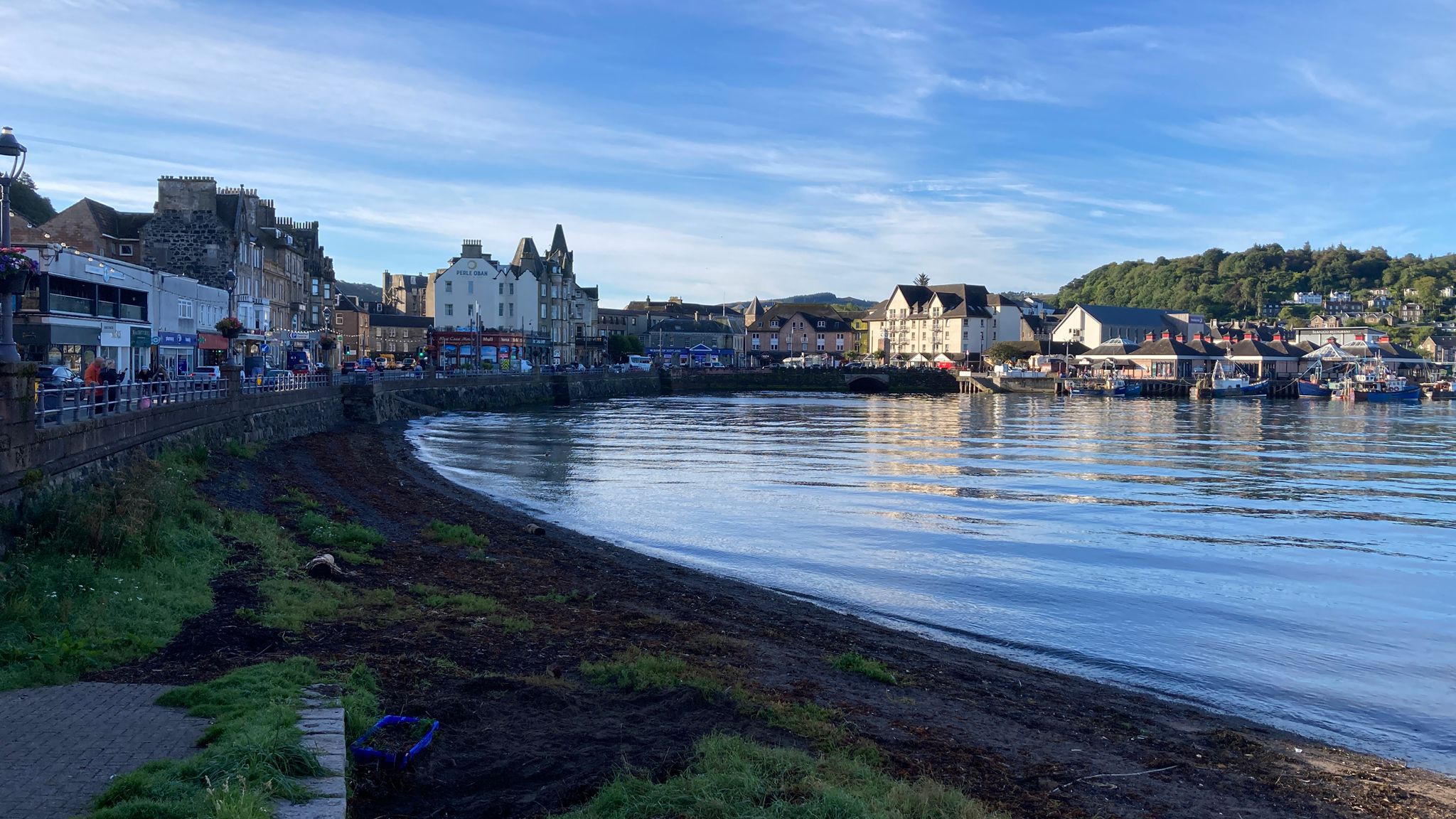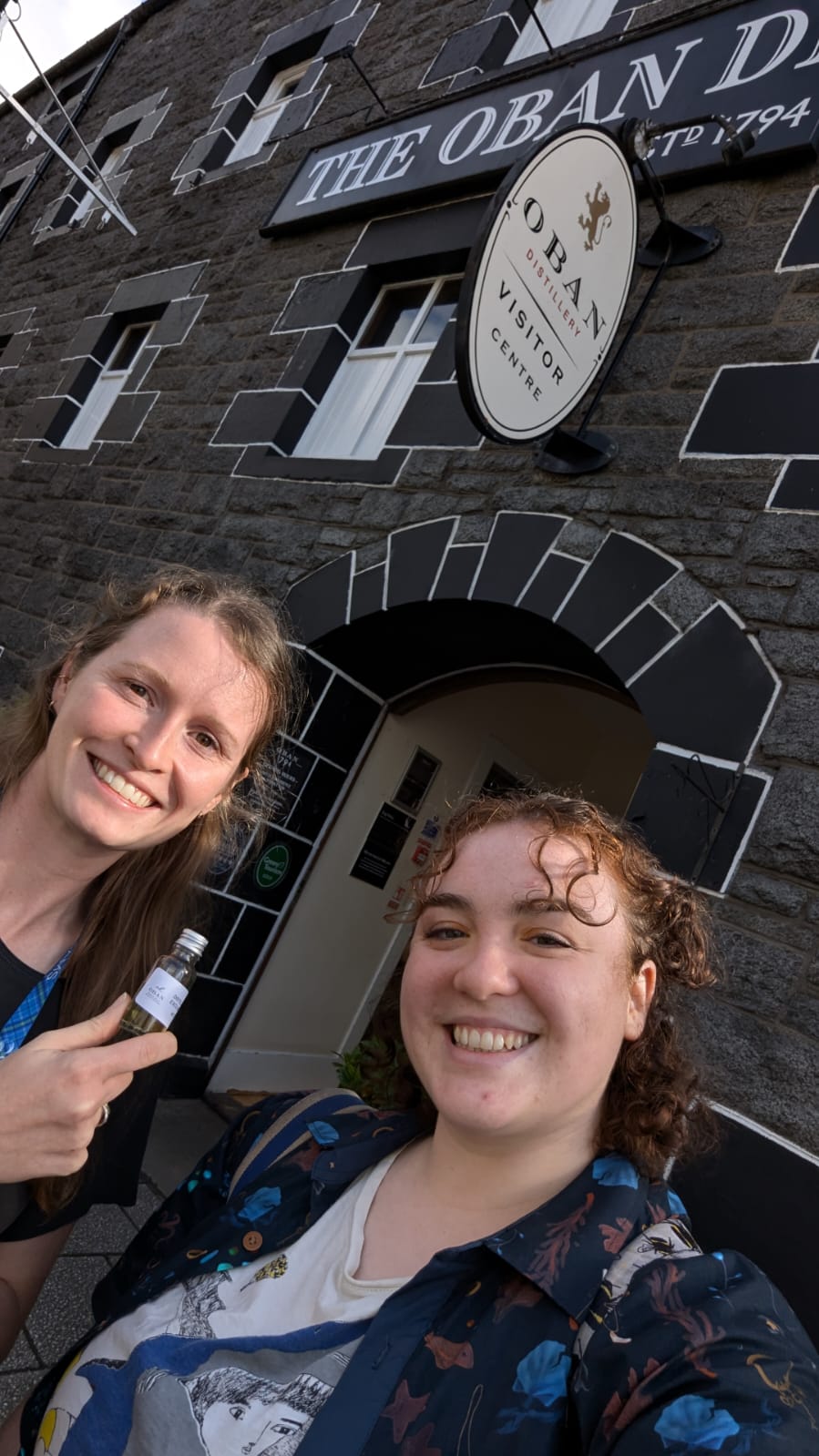2024 Challenger Society Conference
Maddie Shankle
University of St Andrews
Earlier this month, I attended my first meeting of the Challenger Society for Marine Science, thanks to the support of a Challenger Travel Award. I am happy to report it was a productive, educational, and fun experience! As someone who has just finished their PhD in palaeo-oceanography and who is moving into studying modern oceanographic questions in a post-doc next month, it was an excellent way to meet the UK oceanographic community and get caught up to speed on all latest exciting research being done.
The meeting took place in picturesque west coast town of Oban, Scotland. It was excellent getting to walk along the pier to the conference every morning, taking in the salty air and the views of the Isle of Mull and the Atlantic farther afield, and I can’t imagine a better place to have held an oceanography conference. It was also excellent getting to visit the Scottish Association for Marine Science (SAMS), somewhere I had heard lots about (being based in Scotland myself) but have never managed to visit.

The conference venue was in a local hall with both a large poster hall and gathering space for large talks and a few smaller rooms for parallel talks as well. This made it easy to find and meet people, and I found it overall a much more intimate and friendly conference than many I have been to! I was able to both reconnect with old friends and colleagues from my MSc programme and a summer school I attended and meet new ones. (This was also facilitated by a series of social activities that took place mid-conference. I attended a tour of the local Oban Distillery!)
I was also very impressed and pleased with the breadth and depth of material covered in this conference. My own work is very multi-disciplinary, and I was happy to be able to attend talks spanning everything from physical oceanography and eddy parametrizations to biogeochemistry and carbon cycling! Especially helpful was a modelling special-interest group meeting I was able to attend on the last day of the conference. It was fascinating to see the parallels between questions we study in Earth’s past in palaeo-oceanography and those that modern-day oceanographers investigate, and I learned that there is so much still to understand about how our ocean works. The talks I attended gave me several ideas to pursue in my post-doc, and I even re-visited my old MSc thesis, which my MSc supervisor referenced in her talk and which a few people took interest in. These and other meetings I had truly sparked my excitement to be entering this dynamic and friendly field, and I can’t wait to attend the next meeting!

Profile:
Maddie Shankle is currently finishing a PhD in palaeo-oceanography at the University of St Andrews, in which she studied the ocean’s role in taking up carbon from the atmosphere and driving the planet into glacial conditions over Earth’s past ice ages. This work involved both proxy-data generation documenting past ocean carbon content and physical properties as well as numerical modelling experiments testing various proposed mechanisms (physical and biogeochemical) of ocean carbon uptake. This was preceded by a MSc degree in Physical Oceanography at Bangor University, and she will stay on at the University of St Andrews for her post-doc in which she’ll investigate dynamics of sub-polar gyres using idealised models.
Latest News
Marine Data Management, Governance and the MEDIN toolset
The Marine Environmental Data and Information Network (MEDIN) and OceanWise are delighted to invite you to attend our popular free online training workshop: ‘Marine Data Management, Governance and the MEDIN toolset’ on the 19th – 23rd of May 2025.
Workshop on the contribution of UK Arctic Ocean science to the International Polar Year 32/33
12:00 11th June – 16:00 12th June 2025: NOC Southampton (In-person with online option): Registration deadline 16th May
REGISTER HERE
Pre-meeting questionnaire (open to all)
The purpose of this workshop is for the UK Ocean Science community to discuss and then draft a prospectus document outlining the priority Arctic research questions the community would like to address during the run up to, throughout and beyond the International Polar Year 32/33. Additionally, to identify what unique strengths and technologies the UK has to help fill these knowledge gaps.
The second day of the workshop will be dedicated to writing groups, one for each of the priority research questions identified - from both the pre-meeting questionnaire (HERE) and day one discussion. By the end of the meeting, each group will have produced draft text and sourced supporting figures for the prospectus.
Post meeting, the draft will be opened for comments and suggestions from everyone, regardless of whether they were able to attend the workshop or not. It will then be shared with UK funders (UKRI, FCDO, DSIT, ARIA) and potential international programmes with whom we would like to collaborate (e.g. Arctic 2050, Norway). It will form a basis from which wider integration with terrestrial, atmospheric and cryosphere communities can be built, e.g. at the UK Arctic Science Meeting in September in Northumbria.
To ensure balanced community and ECR representation, and to ensure that the size of the writing groups is efficient and effective, if the number of registrations from individual institutes becomes overwhelming, we may contact individuals or teams and ask that each institute selects a smaller number of individuals to attend in-person. Please wait for confirmation of in-person attendance before finalising travel arrangements.
The workshop will be open to hybrid attendance and contributions on both days.
Challenger Society Council Position Vacancy
The Challenger Society for Marine Science (CSMS) are pleased to announce an exciting opportunity to support the next generation of ocean scientists and innovators. CSMS are looking for a new Council member to fill the Student Travel Awards and Stepping Stones Portfolio. The successful applicant will administer the travel and research grants available for Early Career Researchers.
The role involves:
- Receiving applications for the two schemes and responding to applicant inquiries
- Soliciting and compiling input from the rest of the Council for assessing the applications
- Communicating with successful and unsuccessful applicants for the two schemes
- Working with the Honorary Treasurer on allocating funds to successful applicants
- Following up with award winners on their reporting requirements
- Attending Council meetings four times a year (in person or online) and contributing to discussions and decision making for CSMS
The usual term for Council members is three years.
For more information about the CSMS Council, please follow this link: https://www.challenger-society.org.uk/The_Council
For more information about our Early Career Researcher grants and awards, please follow this link:
https://www.challenger-society.org.uk/Stepping_Stones
and
https://www.challenger-society.org.uk/Travel_awards
If you are interested in applying or have any questions regarding the role, please contact kathen@bas.ac.uk
